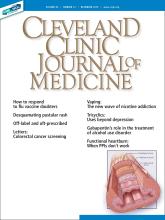Article Figures & Data
Tables
- TABLE 1
Reasons people give for not wanting the influenza vaccine, and potential responses
Reason Potential responses ‘It doesn’t work for many people’ While the vaccine may not work for some people, it does work for most. Even when it does not prevent influenza, it makes influenza-related illness less severe. ‘It has been made to target the wrong virus’ Even when vaccine serotypes don’t match circulating virus serotypes, some effectiveness is retained. Some protection is better than none. A universal flu vaccine that does not need to be updated annually is likely several years away. ‘It makes people sick’ The inactivated vaccine cannot biologically “make people” get influenza, as the virus in the vaccine is inactivated. The nasal live-attenuated vaccine can result in acute upper respiratory tract symptoms, but because it is cold-adapted, it multiplies in the nose, eliciting immunity—but not in the lungs, and thus cannot cause influenza pneumonia. ‘It causes Guillain-Barré syndrome (GBS)’ The increased risk of GBS in the 6 weeks after vaccination reported in 1976 has not been seen in more than 40 influenza seasons since then. The risk is 15 times higher after influenza illness than after influenza vaccination. ‘I got the flu shot, and I still got sick’ The vaccine is intended to prevent influenza. It does not prevent other viral or bacterial illness that may mimic influenza. ‘I’m allergic to eggs’ Persons with a history of urticaria (hives) after exposure to eggs can receive any influenza vaccine.
Persons with a history of angioedema, respiratory distress, lightheadedness, or recurrent vomiting, or who required epinephrine or other emergency intervention after exposure to eggs, should receive the vaccine only in an inpatient or outpatient setting, monitored for severe allergic reactions.
History of a severe allergic reaction such as anaphylaxis to a previous dose of any influenza vaccine, regardless of the suspected component (eg, eggs), is a contraindication to influenza vaccination.‘I don’t want to put poisonous mercury in my body’ Ethylmercury preservative in influenza vaccine is safe, but methylmercury in fish, if ingested in large quantities, can be toxic to the central nervous system. ‘I don’t like needles’ Take the nasal flu vaccine. ‘I don’t want to take anything that can mess with my other medications’ Immunosuppressive drugs may reduce influenza vaccine immunogenicity, but the vaccine does not alter the efficacy of these drugs, other medications, or vaccines. I’m afraid it will trigger an immune response that will make my asthma worse The inactivated influenza vaccine does not precipitate asthma exacerbations. Rather, it prevents 59%–78% of attacks leading to emergency visits or hospitalization. The live-attenuated influenza vaccine is contra-indicated in children 2 to 4 years old with asthma. ‘I had an organ transplant, and I’m afraid the flu shot will cause organ rejection’ Influenza infection—not the vaccine—can precipitate organ rejection. ‘I’m pregnant, and I don’t want to expose my unborn baby to anything potentially harmful’ The flu vaccine during pregnancy protects you and your infant, since protective antibodies are transmitted through the placenta and can last up to 6 months. After the age of 6 months, the child should get annual influenza vaccination. Contraindications Precautions History of a severe allergic reaction such as anaphylaxis to a previous dose of any influenza vaccine, regardless of the component suspected(including eggs) Moderate or severe acute illness with or withoutfever
History of Guillain-Barré syndrome within 6 weeksafter influenza vaccinationFor the live-attenuated quadrivalent influenza vaccine only: Concomitant aspirin-or salicylate-containing therapy in children and adolescents
Children 2 to 4 years old who have diagnosed asthma or whose parents or caregivers report that a healthcare provider has told them during the past 12 months that their child had wheezing or asthma, or whose medical record indicates a wheezing episode in the past 12 months
Children and adults who are immunocompromised due to any cause including immunosuppressive medications and human immunodeficiency virus infection
Close contacts and caregivers of severely immunosuppressed persons who require care in a protected environment
Pregnancy
Receipt of influenza antiviral medication within the past 48 hoursAsthma in persons age 5 and older
Other underlying medical conditions that may predispose to complications after wild-type influenza infection:
Chronic pulmonary disease
Cardiovascular disease, excluding isolated hypertension
Renal, hepatic, neurologic, hematologic, or metabolic disorders including diabetes mellitusAdapted from reference 4.
Ethylmercury Methylmercury Sources Used as a preservative in vaccines and medicines Foods, particularly fish, and dental amalgam Mercury concentration ≤ 25 μg per 0.5 mL in some influenza vaccine products Higher in larger fish: eg, 0.003 parts per million (PPM) in scallops vs 1.23 PPM in tilefish from Gulf of Mexico Clearance from the human body Rapid Slow, since it is not soluble and cannot be excreted Toxicity Redness at injection site; no increased risk of autism Central nervous system effects: eg, tremor, weakness, and behavioral changes






